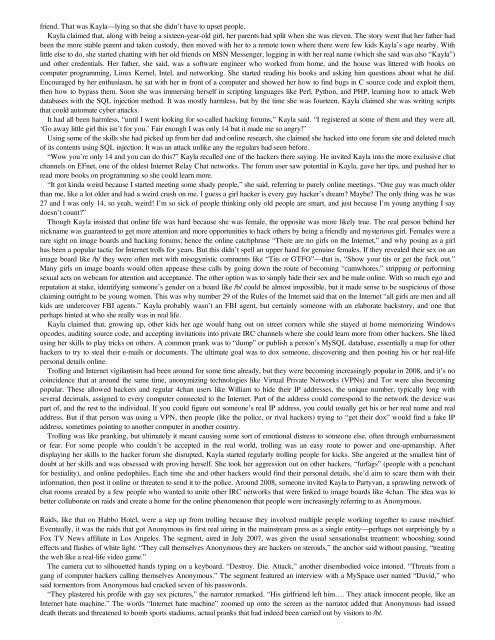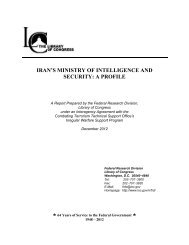We are anonymous inside the hacker world of lulzse
We are anonymous inside the hacker world of lulzse
We are anonymous inside the hacker world of lulzse
You also want an ePaper? Increase the reach of your titles
YUMPU automatically turns print PDFs into web optimized ePapers that Google loves.
friend. That was Kayla—lying so that she didn’t have to upset people.<br />
Kayla claimed that, along with being a sixteen-year-old girl, her p<strong>are</strong>nts had split when she was eleven. The story went that her fa<strong>the</strong>r had<br />
been <strong>the</strong> more stable p<strong>are</strong>nt and taken custody, <strong>the</strong>n moved with her to a remote town where <strong>the</strong>re were few kids Kayla’s age nearby. With<br />
little else to do, she started chatting with her old friends on MSN Messenger, logging in with her real name (which she said was also “Kayla”)<br />
and o<strong>the</strong>r credentials. Her fa<strong>the</strong>r, she said, was a s<strong>of</strong>tw<strong>are</strong> engineer who worked from home, and <strong>the</strong> house was littered with books on<br />
computer programming, Linux Kernel, Intel, and networking. She started reading his books and asking him questions about what he did.<br />
Encouraged by her enthusiasm, he sat with her in front <strong>of</strong> a computer and showed her how to find bugs in C source code and exploit <strong>the</strong>m,<br />
<strong>the</strong>n how to bypass <strong>the</strong>m. Soon she was immersing herself in scripting languages like Perl, Python, and PHP, learning how to attack <strong>We</strong>b<br />
databases with <strong>the</strong> SQL injection method. It was mostly harmless, but by <strong>the</strong> time she was fourteen, Kayla claimed she was writing scripts<br />
that could automate cyber attacks.<br />
It had all been harmless, “until I went looking for so-called hacking forums,” Kayla said. “I registered at some <strong>of</strong> <strong>the</strong>m and <strong>the</strong>y were all,<br />
‘Go away little girl this isn’t for you.’ Fair enough I was only 14 but it made me so angry!”<br />
Using some <strong>of</strong> <strong>the</strong> skills she had picked up from her dad and online research, she claimed she hacked into one forum site and deleted much<br />
<strong>of</strong> its contents using SQL injection. It was an attack unlike any <strong>the</strong> regulars had seen before.<br />
“Wow you’re only 14 and you can do this?” Kayla recalled one <strong>of</strong> <strong>the</strong> <strong>hacker</strong>s <strong>the</strong>re saying. He invited Kayla into <strong>the</strong> more exclusive chat<br />
channels on EFnet, one <strong>of</strong> <strong>the</strong> oldest Internet Relay Chat networks. The forum user saw potential in Kayla, gave her tips, and pushed her to<br />
read more books on programming so she could learn more.<br />
“It got kinda weird because I started meeting some shady people,” she said, referring to purely online meetings. “One guy was much older<br />
than me, like a lot older and had a weird crush on me. I guess a girl <strong>hacker</strong> is every guy <strong>hacker</strong>’s dream? Maybe? The only thing was he was<br />
27 and I was only 14, so yeah, weird! I’m so sick <strong>of</strong> people thinking only old people <strong>are</strong> smart, and just because I’m young anything I say<br />
doesn’t count?”<br />
Though Kayla insisted that online life was hard because she was female, <strong>the</strong> opposite was more likely true. The real person behind her<br />
nickname was guaranteed to get more attention and more opportunities to hack o<strong>the</strong>rs by being a friendly and mysterious girl. Females were a<br />
r<strong>are</strong> sight on image boards and hacking forums; hence <strong>the</strong> online catchphrase “There <strong>are</strong> no girls on <strong>the</strong> Internet,” and why posing as a girl<br />
has been a popular tactic for Internet trolls for years. But this didn’t spell an upper hand for genuine females. If <strong>the</strong>y revealed <strong>the</strong>ir sex on an<br />
image board like /b/ <strong>the</strong>y were <strong>of</strong>ten met with misogynistic comments like “Tits or GTFO”—that is, “Show your tits or get <strong>the</strong> fuck out.”<br />
Many girls on image boards would <strong>of</strong>ten appease <strong>the</strong>se calls by going down <strong>the</strong> route <strong>of</strong> becoming “camwhores,” stripping or performing<br />
sexual acts on webcam for attention and acceptance. The o<strong>the</strong>r option was to simply hide <strong>the</strong>ir sex and be male online. With so much ego and<br />
reputation at stake, identifying someone’s gender on a board like /b/ could be almost impossible, but it made sense to be suspicious <strong>of</strong> those<br />
claiming outright to be young women. This was why number 29 <strong>of</strong> <strong>the</strong> Rules <strong>of</strong> <strong>the</strong> Internet said that on <strong>the</strong> Internet “all girls <strong>are</strong> men and all<br />
kids <strong>are</strong> undercover FBI agents.” Kayla probably wasn’t an FBI agent, but certainly someone with an elaborate backstory, and one that<br />
perhaps hinted at who she really was in real life.<br />
Kayla claimed that, growing up, o<strong>the</strong>r kids her age would hang out on street corners while she stayed at home memorizing Windows<br />
opcodes, auditing source code, and accepting invitations into private IRC channels where she could learn more from o<strong>the</strong>r <strong>hacker</strong>s. She liked<br />
using her skills to play tricks on o<strong>the</strong>rs. A common prank was to “dump” or publish a person’s MySQL database, essentially a map for o<strong>the</strong>r<br />
<strong>hacker</strong>s to try to steal <strong>the</strong>ir e-mails or documents. The ultimate goal was to dox someone, discovering and <strong>the</strong>n posting his or her real-life<br />
personal details online.<br />
Trolling and Internet vigilantism had been around for some time already, but <strong>the</strong>y were becoming increasingly popular in 2008, and it’s no<br />
coincidence that at around <strong>the</strong> same time, anonymizing technologies like Virtual Private Networks (VPNs) and Tor were also becoming<br />
popular. These allowed <strong>hacker</strong>s and regular 4chan users like William to hide <strong>the</strong>ir IP addresses, <strong>the</strong> unique number, typically long with<br />
several decimals, assigned to every computer connected to <strong>the</strong> Internet. Part <strong>of</strong> <strong>the</strong> address could correspond to <strong>the</strong> network <strong>the</strong> device was<br />
part <strong>of</strong>, and <strong>the</strong> rest to <strong>the</strong> individual. If you could figure out someone’s real IP address, you could usually get his or her real name and real<br />
address. But if that person was using a VPN, <strong>the</strong>n people (like <strong>the</strong> police, or rival <strong>hacker</strong>s) trying to “get <strong>the</strong>ir dox” would find a fake IP<br />
address, sometimes pointing to ano<strong>the</strong>r computer in ano<strong>the</strong>r country.<br />
Trolling was like pranking, but ultimately it meant causing some sort <strong>of</strong> emotional distress to someone else, <strong>of</strong>ten through embarrassment<br />
or fear. For some people who couldn’t be accepted in <strong>the</strong> real <strong>world</strong>, trolling was an easy route to power and one-upmanship. After<br />
displaying her skills to <strong>the</strong> <strong>hacker</strong> forum she disrupted, Kayla started regularly trolling people for kicks. She angered at <strong>the</strong> smallest hint <strong>of</strong><br />
doubt at her skills and was obsessed with proving herself. She took her aggression out on o<strong>the</strong>r <strong>hacker</strong>s, “furfags” (people with a penchant<br />
for bestiality), and online pedophiles. Each time she and o<strong>the</strong>r <strong>hacker</strong>s would find <strong>the</strong>ir personal details, she’d aim to sc<strong>are</strong> <strong>the</strong>m with <strong>the</strong>ir<br />
information, <strong>the</strong>n post it online or threaten to send it to <strong>the</strong> police. Around 2008, someone invited Kayla to Partyvan, a sprawling network <strong>of</strong><br />
chat rooms created by a few people who wanted to unite o<strong>the</strong>r IRC networks that were linked to image boards like 4chan. The idea was to<br />
better collaborate on raids and create a home for <strong>the</strong> online phenomenon that people were increasingly referring to as Anonymous.<br />
Raids, like that on Habbo Hotel, were a step up from trolling because <strong>the</strong>y involved multiple people working toge<strong>the</strong>r to cause mischief.<br />
Eventually, it was <strong>the</strong> raids that got Anonymous its first real airing in <strong>the</strong> mainstream press as a single entity—perhaps not surprisingly by a<br />
Fox TV News affiliate in Los Angeles. The segment, aired in July 2007, was given <strong>the</strong> usual sensationalist treatment: whooshing sound<br />
effects and flashes <strong>of</strong> white light. “They call <strong>the</strong>mselves Anonymous <strong>the</strong>y <strong>are</strong> <strong>hacker</strong>s on steroids,” <strong>the</strong> anchor said without pausing, “treating<br />
<strong>the</strong> web like a real-life video game.”<br />
The camera cut to silhouetted hands typing on a keyboard. “Destroy. Die. Attack,” ano<strong>the</strong>r disembodied voice intoned. “Threats from a<br />
gang <strong>of</strong> computer <strong>hacker</strong>s calling <strong>the</strong>mselves Anonymous.” The segment featured an interview with a MySpace user named “David,” who<br />
said tormentors from Anonymous had cracked seven <strong>of</strong> his passwords.<br />
“They plastered his pr<strong>of</strong>ile with gay sex pictures,” <strong>the</strong> narrator remarked. “His girlfriend left him…. They attack innocent people, like an<br />
Internet hate machine.” The words “Internet hate machine” zoomed up onto <strong>the</strong> screen as <strong>the</strong> narrator added that Anonymous had issued<br />
death threats and threatened to bomb sports stadiums, actual pranks that had indeed been carried out by visitors to /b/.



